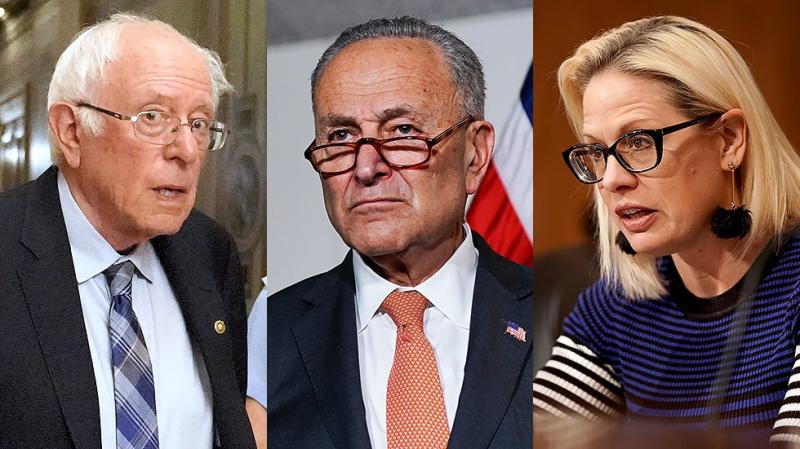Democrats wary of emerging bipartisan infrastructure deal
By: Alexander Bolton (MSN)


Save the bloat! Can anyone explain what climate change, long-term home care, and prescription drugs have to do with infrastructure?
Bipartisanship isn't dead. These huge omnibus spending bills begin with a small core that has popular support by the public and general agreement by Democrats and Republicans. But party leadership tries to grow a rotten apple around that core of agreement.
Democrats have drawn a red line for inclusion of climate change spending in the Big Bill. Yet, Democrats are adamantly opposed to any increase of gas taxes? Is that because it's not called a carbon tax?
Joe Biden is demanding a minimum of $600 billion in new expenditures. Okay. But that doesn't explain the priorities for those expenditures. Biden seems to be a Looky Looky man pestering the tourists.
Democratic leadership (since Democrats are driving the legislation) don't want bipartisanship, compromise, or agreement. The bipartisan core of the legislation doesn't justify spending $2 trillion; the bipartisan core is too small to be Big and Bold. Since Congress has killed earmarks, these bloated omnibus spending bills are the only way to bring home the bacon. The government is forced to spend $3 of public money to get the $1 that is needed.
Pushing these bloated omnibus spending bills through reconciliation isn't about fiscal responsibility, government doing big things, serving the public, or any of the other high minded drivel party leadership spews behind their podiums.

Progressive Democrats are wary of an emerging deal on infrastructure being negotiated by five Republican and five Democratic senators, fearing it could make it tougher to get prized priorities to President Biden's desk.
The progressives are specifically worried that passing a bipartisan infrastructure package consisting of the most popular infrastructure spending priorities - such as funding for roads, bridges, rail, public transport, airports and rural broadband internet - will make it tougher to marshal support for a bigger reconciliation package down the road.
That bigger package could include many progressive prizes, such as climate change legislation, $400 billion for long-term home care, and language to lower the cost of prescription drugs.
Senate Budget Committee Chairman Bernie Sanders (I-Vt.) fired a shot at the emerging deal Thursday afternoon, declaring it falls far short of what the nation needs.
"The problem is this country faces enormous issues that have been ignored and neglected for a very long period of time," he said. "Even if you look at infrastructure from the narrow perspective of roads and bridges, it's inadequate. That's not me talking, that's the American Society of Civil Engineers."
Sanders said the climate provisions in the bipartisan deal are "totally inadequate."
Sen. Sheldon Whitehouse (D-R.I.) also expressed fear that climate change may get left aside if Congress moves a scaled-down infrastructure bill.
"We need a big climate bill - and fast - to stay in nature's 1.5 degrees C safe zone," Whitehouse tweeted Thursday.
Moderate Democrats are embracing the scaled-down spending goal as a solid investment in the nation's infrastructure needs. But progressives are gearing up for battle. They argue the "new funding" over existing programs is "inadequate."
And they fear that if a bipartisan bill moves through the Senate with support from Republicans and centrists such as Sens. Joe Manchin (D-W.Va.) and Kyrsten Sinema (D-Ariz.), it could sap political support for moving a larger spending package under the budget reconciliation process later this year.
The budget reconciliation package is unlikely to draw GOP support, meaning every Democrat will have to stick together to get 50 votes, with Vice President Harris then positioned to break a Senate tie.
But Manchin and Sinema have both bucked the party on key issues and moving a bipartisan bill might eliminate some of the sweeteners from a reconciliation package that could win their support.
The $1.2 trillion tentative eight-year deal announced by the bipartisan Senate group includes about $579 billion in new spending on infrastructure, say senators familiar with the plan.
And it would be paid for in part by a hike in the gas tax tied to inflation, an idea already dividing the Democratic caucus.
"I think the gas tax is a fairly regressive way of funding transportation. It hurts rural America especially hard," said Sanders.
There are doubts that the deal being discussed can win support from the White House, which has been cool to a gas tax at a time when it is pushing for tax hikes only on wealthier households. Biden previously told senators in the bipartisan group that he opposed increasing the gas tax, which would hit poor and middle-class families.
One Democratic senator who requested anonymity to comment frankly on his colleagues' tentative agreement called it a publicity ploy that probably wouldn't go anywhere. This senator argued the bill is too small to win support from Democrats and Biden, who had pushed for much more in spending.
"We need to be mindful, the American people want something big and bold, that's how we'll be judged," the lawmaker said. "If it fails to meet the moment, it's too small.
"In this instance, bad policy is bad politics," the lawmaker who warned that a package that is too small "is bad for all of us in 2022."
Still, it's not clear where Biden will ultimately come down. News of the emerging deal popped Thursday while the president was on his first official visit overseas.
Biden has sought to coax GOP senators toward him, and threw his support behind the bipartisan Senate effort this week after ending talks with Sen. Shelley Moore Capito (R-W.Va.). He has talked repeatedly of a desire to move on bipartisan legislation and to break Washington's gridlock.
Republican senators who negotiated the $1.2 infrastructure framework said they haven't yet had a chance to present it to Biden or senior White House officials.
Sen. Bill Cassidy (R-La.), one of the GOP negotiators, said in April that raising the gas tax was off the table because of Biden's opposition.
"The president has said he's absolutely against it so it's dead," Cassidy said at the time. "If he's against it, it's not going to happen."
But some Democrats like the idea, notably Sen. Tom Carper (D-Del.), the chairman of the Environment and Public Works Committee, which has jurisdiction over infrastructure.
"Things worth having are worth paying for. As I've said for the last two Congresses, at a minimum we should index the gas tax to inflation to help fund investments in climate-resilient infrastructure," Carper tweeted Thursday afternoon.
Two Republican senators involved in the talks said that Biden informed Capito last month that a deal must provide at least $600 billion in new spending.
They say their new proposal comes very close to that, with $579 billion in new dollars.
One Republican senator who worked on the deal said a good number of Democrats want to avoid passing all of Biden's infrastructure agenda with a party-line vote under budget reconciliation, which would allow them to bypass a GOP filibuster.
"The Democrats, a lot of them, are not really keen on this big, broad approach to reconciliation," the lawmaker said.
Senate Majority Leader Charles Schumer (D-N.Y.) said he wanted to review the details of the deal before passing judgment.
"I was told verbally the stuff, I've asked for paper. I'll go look at it," he said. "But we continue to proceed on two tracks, a bipartisan track and a reconciliation track and both are moving forward.
"That's all I'm saying. Stay tuned," he added.






The biggest threat to our democracy are Looky Looky men, pretending to be public servants. pestering the voters.
Democrats have compromised with the gop over and over again making changes and compromises to get gop support butt the gop always bales on their promises and votes against the compromise.
So, yeah, Democrats are wary of believing the gop.
Really would like some case studies on that assumption. Only times I remember any bailing going on was when the GOP read the fine print and saw the garbage. Now if you want to talk history, let's go back, waaaay back to Ronald Reagan and the Dems promise of closing the border for amnesty. Never approve the funding...........after the amnesty was signed.
How often are Republicans accused of bloating spending bills?
The bipartisan negotiations on infrastructure (that excluded party leadership and the White House) has narrowed down the infrastructure package to traditional infrastructure plus broadband with an expenditure of about $600 billion. So what was the other $1.3 trillion in Biden's proposal for?
Democrats have mashed together a number of spending bills into one omnibus bill being hawked as infrastructure legislation. Democrats may be willing to compromise on infrastructure but that is only a small portion of the omnibus bill. Democrats are not compromising on the larger parts of the omnibus bill. What does prescription drugs have to do with infrastructure?
Democrats are complaining that Republicans agreed to a third of the spending but won't pass the two thirds that Democrats have mashed into the omnibus bill and haven't been part of negotiations. Why should Republicans go along with Democrats' bait-and-switch tactics?
"Earmarks explosion: Republicans could set record with big spending on pork barrel projects"
"Republicans have long defined themselves as the party of fiscal restraint and limited government. But after just two years of complete control of the nation’s capital, that same party has presided over an explosion of the most corrupt, unfair, and swampy practice in congressional history: pork-barrel earmarks.
Citizens Against Government Waste’s 2018 Congressional Pig Book exposes 232 earmarks in fiscal year 2018, 42 percent more than FY 2017 . The cost of earmarks exploded to $14.7 billion, a 116 percent increase from last year and nearly nine times more than the increase in discretionary spending from FY 2017 to 2018."
" House Republicans on Wednesday voted to reverse their conference-wide ban on earmarks , according to two sources familiar with the vote, marking a change after the spending practice had been banned for a decade."
"Republicans lead "pork" spending lists: report"
" Republicans in the U.S. Congress, trying to appear frugal with taxpayer dollars this election year, found on Wednesday that some in their own ranks topped a list of “pork” spenders in a watchdog group’s analysis of government waste .
The annual survey by Citizens Against Government Waste claims that 11,610 special-interest projects were stuffed into spending bills"
"according to the survey, it was individual Republicans who pushed the most “pork” last year . In addition, the three House of Representative Republicans who sponsored legislation calling for a moratorium on such spending all engaged in the practice, the report said."
It is only bad when the other guy does it.
So, $14.7 billion in Republican earmarks is bloated spending legislation. But Democrats' $1,300 billion above bipartisan agreement on $600 billion is prudent use of public funds. That must be New York accounting.
Spending money on desperately needed crumbling infrastructure isn't "pork". The other $1.3 trillion was for more infrastructure, the compromise bill is cutting infrastructure spending to only things they feel are absolutely necessary because they're already broken instead of trying to invest in America and fix rods and bridges before they fail or break.
I see. Democrats are more than willing to compromise on Republicans' infrastructure spending of $600 billion to fix roads and bridges before they fail. But Democrats' infrastructure spending of $1,300 billion for whatever Democrats call infrastructure is off the table. That sounds like a New York Times fact check.
What is funny is the last several days there have been seeds about how Biden has made the price of gas go up.
In this 'bi-partisan' bill the funding is in part paid for by an increased gas tax.